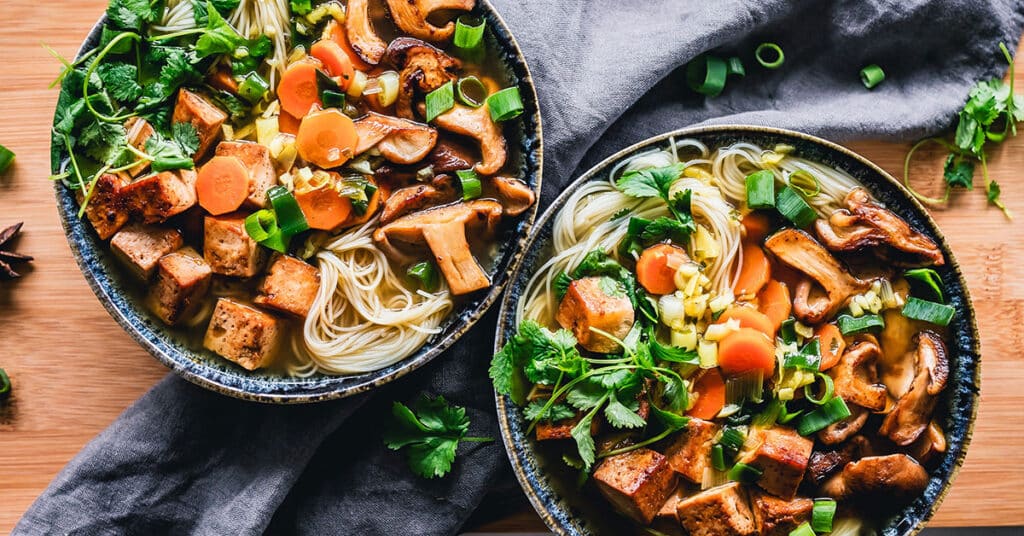Healthy Vegetarian Foods – Highest in Protein, Lowest in Carbs
Top quality vegetarian foods that are the highest in protein, lowest in carbs, are not hard to find. There are many different varieties that can contribute to a high protein vegetarian diet based on your specific requirements. I have included nutrient breakdowns to help you decide exactly what to cook and include in your diet.
Protein is an essential macronutrient and an important part of every cell in your body. It is used to repair and build tissue, bones, muscles, skin, blood and cartilage. It assists in the creation of enzymes, hormones and essential bodily chemicals.
The human body cannot store protein, which is why it must be replenished consistently. Carbohydrates on the other hand can be stored as fat. This happens if the total expended number of calories is less than the total intake of calories.

Without further ado, the following ten foods are all healthy and nutritious, valuable additions to a varied and healthy diet.
Vegetarian Foods Highest in Protein, Lowest in Carbs
Pistachios
Eaten by humans since 6000 bc, pistachio nuts are a member of the cashew family, springing from a small tree that originated in Central Asia and the Middle East.
Research reports that pistachios have among the highest levels of antioxidants including y-tocopherol, phytosterols and xanthophyll carotenoids. These substances have powerful antioxidant and anti-inflammatory effects on the human body.
The high fibre content of pistachios is good for gut health, and lutein and zeaxanthin, also found in pistachios, are essential for the health of your eyes.
Per 1/4-cup serving:
- 172 calories
- 14 g fat (2 g sat)
- 8 g carbs (5 g net)
- 2.3 g sugar
- 0 mg sodium
- 3 g fibre
- 6 g protein
Ricotta
Ricotta is an Italian cheese that is packed with whey protein. This aids muscle growth, reduces high cholesterol levels and helps to lower blood pressure.
Ricotta cheese is produced by heating milk until the curds and whey separate.
The curds are then used for other cheeses such as mozzarella, while reheating the whey produces moist, fine grains that traditionally create ricotta. The name itself means “twice cooked”.
Per 1/2-cup serving (part-skim):
- 171 calories
- 10 g fat (3 g sat)
- 6 g carbs
- 0.4 g sugar
- 123 mg sodium
- 0 g fibre
- 14 g protein
Tofu
A protein packed food source, Tofu is produced by curdling fresh soya milk, pressing it into a solid block and then cooling it.
It contains all nine essential amino acids and is a valuable source of minerals such as manganese, selenium and phosphorous. Tofu is also a good source of iron, magnesium, copper, zinc and vitamin B1.
“Like many soya foods, tofu originated in China. Legend has it that it was discovered about 2000 years ago by a Chinese cook who accidentally curdled soy milk when he added nigari seaweed. Introduced into Japan in the eighth century, tofu was originally called okabe. Its modern name did not come into use until 1400.”
Per ½ cup serving:
- 181 calories
- 11g fat (2g sat)
- 4g carbs (1g net)
- 0g sugar
- 18mg sodium
- 3g fibre
- 22g protein

Pumpkin Seeds
Pumpkin Seeds contain protein, iron, zinc, copper, magnesium and manganese. It contains twice as much protein per 1-oz serving as carbohydrate.
Manganese is an important element in the production of collagen, vital for healthy skin and bone. Magnesium enhances sleep, muscle recovery and mood. Copper and iron also assist with energy production, whilst the latter also helps to transport oxygen to cells.
Per 1-oz serving (roasted):
- 163 calories
- 14 g fat (2 g sat)
- 4 g carbs (2 g net)
- 0.4 g sugar
- 5 mg sodium
- 2 g fibre
- 8 g protein
Greek Yoghurt
Greek Yoghurt goes through a straining process to remove lactoserum or whey. Whey consists of water and lactose (the sugar that is found in milk) and this alters the texture, giving Greek yoghurt a thicker, richer consistency.
Rich in protein, Greek yoghurt also contains calcium, phosphorus and riboflavin.
According to research “The word yogurt is believed to be derived from the Turkish word “yoğurmak,” which means to thicken, coagulate, or curdle. While references to the health-promoting properties of yogurt date back to 6000 BC in Indian Ayurvedic scripts, it was not until the 20th century that Stamen Grigorov, a Bulgarian medical student, attributed the benefits to lactic acid bacteria.”
Per one 7-oz container (plain, low-fat):
- 146 calories
- 4 g fat (3 g sat)
- 8 g carbs
- 7 g sugar
- 68 mg sodium
- 0 g fiber
- 20 g protein
Avocado
This fruit contains substantial amount of healthy monounsaturated fatty acids, magnesium, potassium, riboflavin and vitamins C, E, K and B-6.
They also contain high levels of folate, which can alleviate the symptoms of depression. According to The Harvard Medical School “it may be useful in the treatment of depression and other psychiatric symptoms.” Monosaturated fats are some of the healthiest sources of fats available for humans, and are a great source of energy as well.
Per avocado:
- 322 calories
- 29 g fat (4 g sat)
- 17 g carbs (3 g net)
- 1 g sugar
- 14 mg sodium
- 14 g fibre
- 4 g protein
Eggs
Eggs are one the most powerful sources of protein available.
Eggs also contain a plethora of disease-fighting nutrients like lutein and zeaxanthin. Increasing these nutrients in your diet can help to alleviate the risk of age-related macular degeneration, the leading cause of blindness in older adults.
Per one whole, large egg:
- 72 calories
- 5 g fat (2 g sat)
- 0.4 g carbs
- 0.2 g sugar
- 71 mg sodium
- 0 g fibre
- 7 g protein
Vegetarian Foods Highest in Protein, Lowest in Carbs – Edamame
An Edamame is a young soybean, harvested before the bean itself begin to ripen or harden. They can be easily found in many variations including shelled, fresh, frozen or still in the pod.
Edamame are low in calories and work as an excellent healthy snack that is naturally gluten free. Edamame are also rich with iron, protein, calcium and contain no cholesterol.
Per 1-cup serving:
- 188 calories
- 8 g fat (1 g sat)
- 14 g carbs (6 g net)
- 3 g sugar
- 9 mg sodium
- 8 g fibre
- 18 g protein
Almonds
Almonds are actually the seeds of the fruit of the almond tree. They contain high levels of potassium and magnesium, great for effective muscle recovery.
Almonds can also be effective at reducing the risk of heart disease and diabetes.

According to research “Lessening after-meal surges in blood sugar helps protect against diabetes and cardiovascular disease, most likely by lessening the increase in cholesterol-damaging free radicals that accompanies large elevations in blood sugar. This is one reason why low- glycemic index diets result in lower risk of diabetes and heart disease. Almonds appear to not only decrease after-meal rises in blood sugar, but also provide antioxidants to mop up the smaller amounts of free radicals that still result.”
Per 1/4-cup serving:
- 207 calories
- 18 g fat (1 g sat)
- 8 g carbs (2 g net)
- 2 g sugar
- 0 mg sodium
- 5 g fibre
- 8 g protein
Vegetarian Foods Highest in Protein, Lowest in Carbs – Chia Seeds
Chia seeds are a complete protein, containing all nine essential amino acids that cannot be made by the body.
According to Harvard School of Public Health “Chia seeds come from the plant Salvia hispanica L., and were at one time a major food crop in Mexico and Guatemala. Cultivated as a food source as early as 3500 BC, it was offered to Aztec gods in religious ceremonies.”
Per 1-oz serving:
- 138 calories
- 9 g fat (0.1 g sat)
- 12 g carbs (2 g net)
- 2 g sugar
- 5 mg sodium
- 10 g fibre
- 5 g protein
If you are looking for vegetarian foods that are highest in protein, lowest in carbs, then all the above ten are a great place to start.
A protein-rich diet will help to reduce hunger, boost your metabolism, and build muscle.
Try these healthy vegan soup recipes or learn more about what foods you need to eat in order to maintain healthy levels of Vitamin B12.




